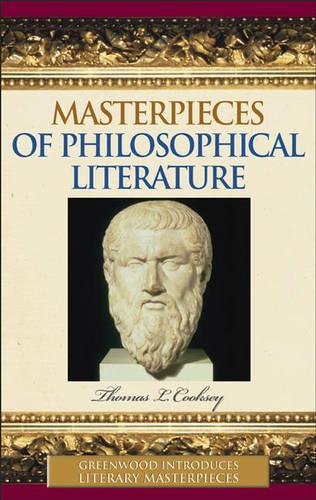
Masterpieces of Philosophical Literature
(Hardback)
Publishing Details
Masterpieces of Philosophical Literature
By (Author) Thomas L. Cooksey III
Bloomsbury Publishing PLC
Greenwood Press
30th March 2006
United States
Classifications
Professional and Scholarly
Non Fiction
Philosophy
808.80384
Physical Properties
Hardback
256
Width 156mm, Height 235mm
510g
Description
Some works of philosophy also stand as significant contributions to literature, and some works of literature have profoundly influenced philosophy. Written expressly for high school and college students, this reference insightfully introduces ten widely studied works of philosophical literature. Individual chapters discuss Plato's Republic, Augustine's Confessions, Dante's Divine Comedy, More's Utopia, Voltaire's Candide, Goethe's Faust, Kierkegaard's Either/Or, Nietzsche's Thus Spoke Zarathustra, Huxley's Brave New World, and Borges' Labyrinths. An introductory chapter considers such issues as the nature of philosophical literature, and the volume closes with a selected, general bibliography. Despite Plato's banning of poets from the ideal community, some works of philosophy also stand as significant contributions to literature, and some works of literature have profoundly influenced philosophy. Such works have the power to challenge, provoke, and move the reader, and they upset complacent assumptions and demand new thinking. They also draw on the resources of language and literature to explore enduring issues. Written expressly for high school and college students, this reference conveniently introduces ten widely studied works of philosophical literature.
Reviews
Cooksey aims to introduce readers to the philosophical content of literature and the literary form of philosophy by surveying ten masterpieces of philosophical literature. Each of the ten chapters of Masterpieces focuses on one book: Plato's Republic, Augustine's Confessions, Dante's Divine Comedy, More's Utopia, Voltaire's Candide, Goethe's Faust, Kierkegaard's Either/Or, Nietzsche's Thus Spoke Zarathustra, Huxley's Brave New World, and Borges's Labyrinths. For each book, Cooksey discusses the biographical and historical context of the author, the themes and motifs of the work, and subsequent influence of the author on Western philosophy and literature. Although most of Cooksey's discussions focus on providing summaries of the individual texts listed above, he also makes general claims about philosophical literature: it represents a certain mode of thinking that is irreducible to reasoned argument, and its openness to reinterpretation and resistance to one exclusive or final meaning enables it to remain eternally current. The general idea for this book is visionary.Lower-division undergraduates and general readers. * Choice *
Aimed at high school and college students, this introduction to philosophy groups 10 works central to philosophical literature into a section of works of philosophy that are also significant contributions to literature and a section of works of literature that draw on or contribute to philosophy. Each chapter centers on a single book, such as Plato's Republic, Dante's Divine Comedy, Goethe's Faust and Borges' Labyrinths, and discusses the author and his philosophical background as well as the work itself. * Reference & Research Book News *
Author Bio
Thomas L. Cooksey is Professor of English and Philosophy at Armstrong Atlantic State University. His interests range from biochemistry and molecular biology to the modern reception of Dante, and his numerous articles cover such topics as Petrarchism, the Beats, Flannery O'Connor, Simone de Beauvoir, and Leibniz and Spinoza.
